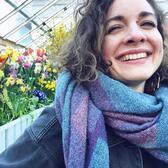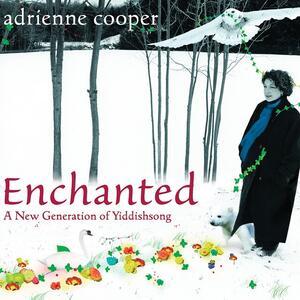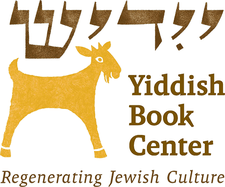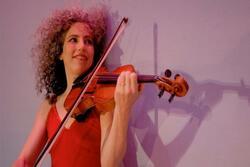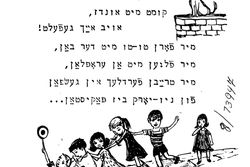From the Archive: Cover of Adrienne Cooper’s Album, "Enchanted: A New Generation of Yiddishsong"
What we found:
The item featured here is Enchanted: A New Generation of Yiddishsong, renowned Yiddish singer and educator Adrienne Cooper’s last album, which was released in 2011. The album, which includes various stars of the contemporary Yiddish music scene, including Marilyn Lerner, Michael Winograd, Benjy Fox-Rosen, Avi Fox-Rosen, Frank London, and Patrick Farrell, weaves together new songs and contemporary reinterpretations of traditional Yiddish and klezmer pieces.
Adrienne, z”l, was interviewed as part of the Yiddish Book Center’s Wexler Oral History Project in 2010. The album cover featured here is viewable on her interview page on the Center’s website, along with her full video interview and interview highlights. The interview is accompanied by a searchable time-coded transcript as well as an index, work that was made possible by a 2017–2020 grant from the National Endowment for the Humanities to enhance the project’s accessibility.
Why it matters:
Adrienne Cooper was a luminary of contemporary Yiddish music, language, and culture. Born in Oakland, California, she was the daughter of Yiddish and Hebrew singer Buni Cooper (née Barach). After beginning to study Yiddish while pursuing her PhD in History on Hebrew and Yiddish writers in the US, she became assistant director of YIVO’s Max Weinreich Center for Advanced Jewish Studies, and then director of the YIVO Institute for Jewish Research summer program and assistant director at YIVO.
Growing out of her work on the YIVO summer program, she, Henry Sapoznik, and others eventually founded KlezKamp, an annual klezmer music and Yiddish cultural festival in New York. Yiddishkayt was such an intrinsic part of Adrienne’s life that, when discussing her mother in her own oral history interview, her daughter Sarah Gordon said, “My mom never really talked of herself as a Yiddishist. It was just kind of like, ‘And that's our world.’”
One of the many beautiful things that Adrienne brought to her music, her activism, and to the Yiddish world was her passion for intergenerational community building, or what she called “intergenerational conversation.” Her belief that Yiddish language and music could give people a chance to understand and connect to their history and culture was woven into the way she performed, taught, and collaborated with other artists. In Enchanted: A New Generation of Yiddishsong, her deep emotional connection to Yiddish song and her love for bringing Jewish history into contemporary contexts shines through, both in her interweaving of old and new Yiddish music, and in her inclusion of myriad other artists from Jewish and non-Jewish musical spheres.
One of the most profound pieces on the album, “A Lider Bukh,” (“A Song Book”) perfectly encapsulates Adrienne’s devotion to bringing the past and present into conversation. The song, which incorporates the voice of her own grandfather davening (praying) as well as her daughter Sarah’s voice, blends together several songs about family. As the album review on Virtual Womex beautifully states, “The effect of this masterpiece [...] is mystical and haunting, deeply connected to family and history.” Indeed, part of Adrienne’s gift to the world of Yiddish music was weaving together the threads of past and present, of professional and personal, of secular and spiritual, to connect people to each other and to their own identities.
In her interview with the Wexler Oral History Project, Adrienne said, “What I’d like future generations to know is that this culture belongs to them. That they have a right to take it, to explore it, to create something of their own in it. [...] I really hope that they’ll be, you know, kind of bold and fearless—that Jewish culture and Jewish literacy and Yiddish culture and Yiddish literacy is hard to come by. It’s work. And because we don’t live in a Yiddishland, right, in a full environment— for an adult who’s smart and fluent and spontaneous, there is an awkwardness to expressing oneself, to feeling competent, to feeling brave about representing this culture. But the only way that it’s going to persist is in that courage. And it’s a lot to ask of people. But they have every right. And in a way, they have a responsibility if they want to take that on. And I wish for them that kind of courage and recklessness—you know, to just throw themselves at it and to own it.”
Adrienne’s warm and inviting approach to education and music certainly inspired many to engage more deeply with their roots and to take a more active part in those intergenerational conversations. Listening to Enchanted evokes both a nostalgic pride in the history of Yiddish music and language and an excitement about making a place for it in contemporary Jewish culture.
Adrienne passed away in 2011, the same year this album was released. There is something beautifully bittersweet in the fact that this was her last album; the music is indeed enchanting and enchanted, as she and her work always were.
Fun Fact:
Adrienne’s daughter Sarah Mina Gordon is also a musician, and the two collaborated on several projects. You can check out Sarah’s interview with the Yiddish Book Center’s Wexler Oral History Project, alongside a time-coded transcript and index, here and read more about her band, Yiddish Princess, here.
Learn More:
You can watch Adrienne’s full interview (with a searchable transcript and index) and interview highlights on her interview page.
This post is part of JWA’s From the Archive column. It was written in partnership with The Yiddish Book Center.

